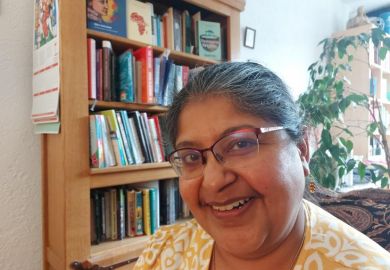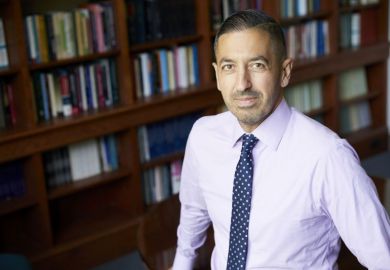Angela Zhang joined the University of Southern California from the University of Hong Kong earlier this year as professor of law. With companies such as Alibaba facing high-profile scrutiny from the US government in recent years, she has become known for her insights on how China regulates its burgeoning technology sector.
Where and when were you born?
Zhanjiang, a mid-sized city in Guangdong, China, in 1981.
How has this shaped you?
Growing up in Guangdong, the first province in China to experiment with market reforms, exposed me to the early impacts of capitalism. Witnessing China’s transformation as it opened up instilled in me a curiosity about the outside world. After receiving my first law degree from Peking University in Beijing, I began my practising career in Hong Kong. A year later, I moved to the US to study law. Upon graduation I practised law in New York, Brussels and London before transitioning to academia. I’ve taught in London and Hong Kong, and now I’m teaching at the University of Southern California.
What is one thing you think everyone should know about Chinese technology regulation?
Chinese tech regulation is characterised by three distinct features: hierarchy, volatility and fragility. In my book High Wire: How China Regulates Big Tech and Governs Its Economy, I explain that hierarchy refers to China’s regulatory structure, volatility describes the regulatory process and fragility pertains to the regulatory outcomes. Due to the hierarchical structure and volatile process, well-intentioned government interventions can often lead to significant unintended consequences.
Your book discusses how Chinese antitrust law has been transformed into a ‘powerful economic weapon’ and used to counter ‘aggressive’ US sanctions – how has this trend impacted current geopolitical tensions?
By holding up large merger transactions in critical and strategic sectors such as semiconductors, China has demonstrated that its vast market access can be leveraged as a potent weapon against US sanctions and restrictions. However, this strategic response has not deterred the US from continuing its aggressive measures against Chinese firms, as seen in recent efforts to restrict artificial intelligence chip access. This approach could also backfire by discouraging foreign investment in China, exacerbating the decoupling trend.
What are you currently researching and why?
I am working on projects on the regulation of AI. AI has already caused significant disruption to many industries, and I believe that both its greatest benefits and worst drawbacks are yet to come. It is essential to study this topic carefully and thoroughly to help policymakers and the general public better understand AI.
Following the advent of AI, how would you summarise China’s current attitude to regulation?
The Chinese government has an ambivalent attitude towards AI. On one hand, AI is expected to bring enormous commercial benefits to the country and is crucial in the Sino-US tech rivalry. Thus, the government is highly supportive of AI development and is deeply embedded in the AI ecosystem as a policymaker, investor, supplier and customer. On the other hand, the government is concerned about AI-generated outputs that might misalign with its political values, which is why it maintains strict control over information. The government is walking a tightrope, trying to balance these competing objectives. In practice, it appears to lean more towards development rather than regulation.
What is the biggest misconception about your field of study?
A common misconception is that regulation is entirely politically driven and that Chinese firms are innocent victims. In fact, the government often has legitimate reasons for intervention. However, many of these actions often come too late and lack robust checks and balances, leading to significant market backlash.
In your opinion, how can better dialogue between the East and West be fostered?
Better dialogue should be built on mutual understanding, making it crucial for both sides to have accurate, timely and natural knowledge about each other. Having lived and practised law in China, the US and Europe, I hope I can help to facilitate dialogues between the East and the West, serving as a bridge to promote better communication and understanding.
What do you like about academia?
I love the freedom it offers. I have complete intellectual freedom and the flexibility to manage my own time and life. Additionally, I find academia to be a highly meaningful career that allows me to help and influence many people.
What do you dislike about academia?
The lack of interdisciplinary research. Despite decades of discussion, scholars from different fields rarely collaborate. However, the practical challenges humanity faces require interdisciplinary solutions.
If you weren’t an academic, what do you think you’d be doing?
I think I would be a lawyer.
What do you do for fun?
Travelling.
What advice would you give to your younger self?
Be patient.
Do you live by any motto or philosophy?
I believe in kindness, diligence and resilience.
What is your greatest ambition?
To be a scholar who earns respect, even from those who might not agree with me.
helen.packer@timeshighereducation.com
CV
2004 Bachelor’s degree in law, Peking University
2006 Master’s degree in law, University of Chicago
2008 Juris doctor, Chicago
2011 Doctor of jurisprudence, Chicago
2013-16 Lecturer in competition law and trade, King’s College London
2016-19 Senior lecturer in competition law and trade, King’s
2017-24 Associate professor of law and director of the Philip K. H. Wong Center for Chinese Law, University of Hong Kong
2024-present Professor of law, Gould School of Law, University of Southern California
Appointments
Sue Rigby, vice-chancellor of Bath Spa University since 2018, will be the next principal of Edinburgh Napier University. The palaeontologist, formerly deputy vice-chancellor for student development at the University of Lincoln, will make the move in January, following the retirement of Andrea Nolan. June Boyle, chair of Edinburgh Napier’s court, hailed Professor Rigby’s “breadth of experience, her values and her commitment to quality higher education, widening access, inclusion and to an excellent student experience”.
Mark Blows has been promoted to provost at the University of Queensland and will take up the role on the retirement of Aidan Byrne in October. The evolutionary geneticist has worked at the institution for 25 years and is currently deputy vice-chancellor (research and innovation). “I’m confident that Mark’s leadership skills and experience, as well as his deep institutional knowledge, will enable him to do a tremendous job as our next provost,” said vice-chancellor Deborah Terry.
Simon Green is joining the University of Salford as pro vice-chancellor for research and enterprise. He has been pro vice-chancellor for research at Aston University since 2018.
Former Cabinet minister Greg Clark will be the first executive chair of the University of Warwick’s Warwick Innovation District. The former Conservative MP held a series of government roles, including business secretary and universities minister.
Pablo Hernández de Cos, the former governor of the Bank of Spain, will become professor of economics at IESE Business School, part of the University of Navarra.
Garrett Thompson will be the next president of Logan University in Missouri. He is currently vice-president for academic affairs at Arizona’s Sonoran University of Health Sciences.
Aurore Hochard is joining Alliance Manchester Business School at the University of Manchester as director of its Masood Entrepreneurship Centre. She is currently head of entrepreneurship programmes at Bayes Business School, part of City, University of London.
Register to continue
Why register?
- Registration is free and only takes a moment
- Once registered, you can read 3 articles a month
- Sign up for our newsletter
Subscribe
Or subscribe for unlimited access to:
- Unlimited access to news, views, insights & reviews
- Digital editions
- Digital access to THE’s university and college rankings analysis
Already registered or a current subscriber?








